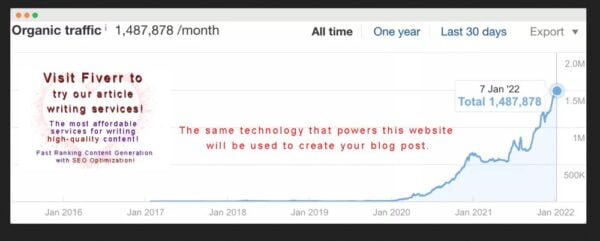Organic Traffic: The Lifeblood of Online Visibility
Imagine walking down a bustling city street filled with shops. Some stores have a steady stream of people coming in because they know about the quality products inside. That’s what organic traffic is like for your website. It’s the flow of visitors who find your site naturally, without you directly inviting them through ads or other paid promotions.
In this article, we’ll explore the organic traffic meaning, how it differs from direct traffic, and share strategies on how to increase organic traffic to your website.

Table of Contents
What is Organic Traffic?
![]()
Organic traffic refers to visitors who land on your website as a result of unpaid search results. These are the people who find you while they’re searching for something online using a search engine like Google, Bing, or Yahoo. They type in a query, and if your site has the information, products, or services they’re looking for, your site might show up in the search results. When they click on your site from these search results, that’s organic website traffic.
Organic Traffic Meaning in the World of SEO
![]()
SEO, or Search Engine Optimization, is the art of making your website more attractive to search engines. The goal is to have your site rank as high as possible in search results for certain keywords or phrases. The better your SEO, the more likely your site will be discovered by people searching for content related to your business, leading to an increase in organic traffic.
Organic vs. Direct Traffic
![]()
It’s important to distinguish between organic and direct traffic, as they are both crucial but come from different sources. Organic traffic, as mentioned, comes from search engines. Direct traffic, on the other hand, is when someone types your website’s URL directly into their browser or clicks on a bookmark. They already know about your website and are returning or visiting directly without the aid of a search engine.
How to Increase Organic Traffic
![]()
Increasing organic traffic is a common goal for website owners because it’s a sign that your site is gaining popularity and authority. Here are some strategies to help you boost your organic traffic:
- Keyword Research: Understand what your target audience is searching for and optimize your content around those terms.
- Quality Content: Create valuable, informative, and engaging content that answers the questions of your audience.
- On-Page SEO: Optimize your website’s pages with proper tags, meta descriptions, and headings.
- Mobile-Friendly Design: Ensure your site is accessible and looks good on mobile devices.
- Page Load Speed: Improve your website’s loading times as slow pages can deter visitors.
- Backlinks: Build relationships with other websites to get quality backlinks, which are like votes of confidence from other sites.
How to Increase Website Traffic Organically: A Deeper Dive
![]()
Let’s take a closer look at some of the strategies mentioned above to give you a better understanding of how to increase website traffic organically.
Keyword Research: Finding the Right Words
Keywords are the foundation of organic traffic. They are the terms and phrases that people type into search engines. By researching and using the right keywords in your content, you can improve your visibility in search results. Tools like Google’s Keyword Planner can help you find keywords that are relevant to your business and have a decent amount of search volume.
Quality Content: The Heart of Organic Traffic
Content is king in the world of organic traffic. Search engines favor websites that provide valuable and relevant information. Your content should solve problems, answer questions, or provide insights that are useful to your audience. This could be in the form of blog posts, videos, infographics, or podcasts. The key is to be consistent and keep the quality high.
On-Page SEO: Fine-Tuning Your Website
On-page SEO involves optimizing individual web pages to rank higher in search engines. This includes using the right keywords in your titles, headings, and throughout the content. It also means making sure your website is structured in a way that search engines understand. This includes proper use of tags like “, , and ” , as well as ensuring that images have descriptive alt text.
Mobile-Friendly Design: Catering to the On-the-Go User
With more people using mobile devices to access the internet, having a mobile-friendly website is no longer optional. Google uses mobile-first indexing, which means it looks at the mobile version of your site for indexing and ranking. A mobile-friendly site should be responsive, meaning it adjusts smoothly to different screen sizes, and it should be easy to navigate on a small screen.
Page Load Speed: Keeping Visitors Happy
Page load speed is a critical factor in user experience and SEO. Slow-loading pages can frustrate visitors and increase the likelihood they’ll leave your site, which can negatively impact your organic traffic. Tools like Google’s PageSpeed Insights can help you analyze your site’s performance and provide recommendations for improvement.
Backlinks: Building Your Website’s Reputation
Backlinks are links from other websites to yours. They are important because they signal to search engines that other sites consider your content valuable enough to link to. The quality of backlinks is more important than quantity; a few links from reputable sites are better than many links from lesser-known sites. You can earn backlinks by creating great content, guest posting on other blogs, and engaging with your online community.
Case Studies and Statistics: Proof in Numbers
![]()
Case studies and statistics can provide concrete evidence of the effectiveness of organic traffic strategies. For example, a study by BrightEdge found that organic search drives 51% of all visitors to B2B and B2C websites, trumping all other non-organic search channels, including paid search and social media. This underscores the importance of investing in SEO and organic traffic generation.
Frequently Asked Questions
![]()
How can I increase organic traffic to my website?
To increase organic traffic, focus on SEO (search engine optimization) practices such as using relevant keywords, creating high-quality and unique content, improving your website’s loading speed and mobile responsiveness, and building backlinks from other reputable websites.
Why is organic traffic important?
Organic traffic is important because it’s targeted. People visiting your site from search engines are looking for something specific, which means they have a higher chance of converting into customers or followers. Plus, organic traffic is cost-effective compared to paid advertising.
How long does it take to see results from SEO?
SEO is a long-term strategy, and it can take several months to a year to see significant results. This is because search engines take time to crawl, index, and rank new content, and it takes time to build up authority and trust.
What are keywords and why are they important?
Keywords are words or phrases that describe the content on your page. They are important because search engines use them to determine what your page is about and how it should rank. Using the right keywords can help your page appear in relevant searches.
Can I measure organic traffic?
Yes, you can measure organic traffic using tools like Google Analytics. This tool can show you how many visitors you’re getting from search engines, which pages they’re landing on, and what keywords they used to find you.
What’s the difference between organic traffic and paid traffic?
Organic traffic comes from unpaid search results, while paid traffic comes from advertisements such as Google Ads or sponsored links. Organic traffic is considered more sustainable and credible in the long run, while paid traffic provides immediate results but can be more expensive.
How do I know which keywords to target?
To figure out which keywords to target, start by thinking about the terms your potential customers might use to search for your products or services. Then, use keyword research tools like Google Keyword Planner to analyze the popularity and competition for these terms.
Does social media affect organic traffic?
While social media directly impacts your organic search rankings, it can indirectly affect them. A strong social media presence can drive more traffic to your website, and increased engagement can lead to more shares and links, which can improve your organic rankings.
Should I focus on quantity or quality of content?
Always focus on the quality of your content rather than quantity. High-quality content that provides value to your audience is more likely to rank well and attract more organic traffic than a large quantity of low-quality content.
Is it important to update old content on my website?
Yes, updating old content can be very beneficial. It keeps your content relevant and can help maintain or improve its ranking in search results. Plus, updated content provides a better user experience for your visitors.
Conclusion: The Road to Organic Traffic Success
![]()
Organic traffic is a vital component of a successful online presence. It’s about attracting visitors who are genuinely interested in what you have to offer. By understanding the meaning of organic traffic, differentiating it from direct traffic, and implementing strategies to increase it, you can build a strong foundation for your website’s growth.
Remember, the key to increasing organic website traffic lies in keyword research, creating quality content, optimizing your on-page SEO, ensuring a mobile-friendly design, improving page load speed, and building a network of backlinks. With patience and persistence, you can see a significant boost in your organic traffic and, ultimately, your business’s success.


